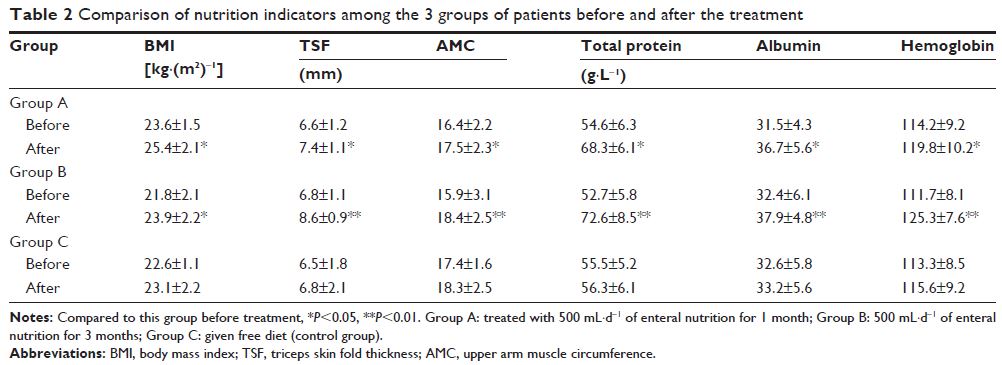9 0 5 7 8
论文已发表
注册即可获取德孚的最新动态
IF 收录期刊
- 2.6 Breast Cancer (Dove Med Press)
- 3.9 Clin Epidemiol
- 3.3 Cancer Manag Res
- 3.9 Infect Drug Resist
- 3.6 Clin Interv Aging
- 4.8 Drug Des Dev Ther
- 2.8 Int J Chronic Obstr
- 8.0 Int J Nanomed
- 2.3 Int J Women's Health
- 3.2 Neuropsych Dis Treat
- 4.0 OncoTargets Ther
- 2.2 Patient Prefer Adher
- 2.8 Ther Clin Risk Manag
- 2.7 J Pain Res
- 3.3 Diabet Metab Synd Ob
- 4.3 Psychol Res Behav Ma
- 3.4 Nat Sci Sleep
- 1.9 Pharmgenomics Pers Med
- 3.5 Risk Manag Healthc Policy
- 4.5 J Inflamm Res
- 2.3 Int J Gen Med
- 4.1 J Hepatocell Carcinoma
- 3.2 J Asthma Allergy
- 2.3 Clin Cosmet Investig Dermatol
- 3.3 J Multidiscip Healthc

肠内营养与炎性因子血清水平之间的关系对心力衰竭老年患者心功能的影响
Authors Zhou H, Qian H
Received 19 November 2017
Accepted for publication 9 January 2018
Published 7 March 2018 Volume 2018:13 Pages 397—401
DOI https://doi.org/10.2147/CIA.S157507
Checked for plagiarism Yes
Review by Single-blind
Peer reviewers approved by Dr Colin Mak
Peer reviewer comments 2
Editor who approved publication: Dr Wu
Objective: To investigate enteral nutrition’s effect on serum inflammatory
factors and the cardiac function of malnourished elderly patients with heart
failure.
Patients and
methods: A total of 105 elderly patients with
heart failure were randomly divided into 3 groups: Treatment Group A, Treatment
Group B, and the Control Group (Group C), each group having 35 patients and
being administered conventional heart failure treatment. Group A was treated
with 500 mL·d-1 of enteral
nutrition for 1 month. Group B was given the same dose of enteral nutrition for
3 months. The Control Group was given free diet. Nutritional risk screening
2002 was used to assess the nutritional status before and after the treatment
for each group. New York Heart Association status was recorded as were left
ventricular ejection fraction, plasma B-type natriuretic peptide, inteleukin-6,
C-reactive protein, and tumor necrosis factor-α.
Results: After the treatment, the body mass index, skinfold thickness of
upper arm triceps, muscle circumference of the upper arm, upper arm muscle
circumference, total protein, albumin, hemoglobin, and left ventricular
ejection fraction in the treatment groups all increased, with relatively obvious
relief of symptoms of heart failure. The levels of B-type natriuretic peptide,
interleukin-6, tumor necrosis factor-α, and C-reactive protein all rose to
different extents (P <0.05) and
Treatment Group B showed more obvious improvement (P <0.01).
Differences shown by the Control Group in each nutrition indicator, serum
levels of inflammatory factors, and cardiac function had no statistical
significance (P >0.05).
Conclusion: The use of enteral nutrition in conventional treatment of elderly
patients with heart failure could improve not only patients’ nutritional status
and cardiac function, but also their immune function, thus reducing the levels
of inflammatory factors. The longer the treatment period is, the more obvious
the improvement in patients’ cardiac function and inflammatory factors will be
observed.
Keywords: enteral nutrition, heart failure, elderly, inflammatory factors, cardiac
function
